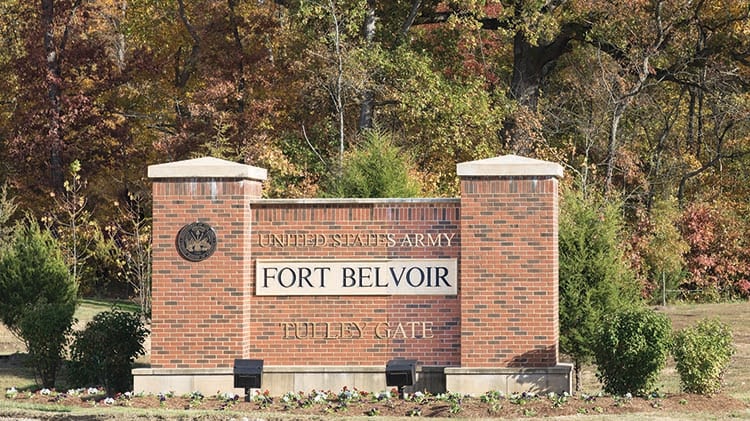The Pentagon’s Confederate renaming commission is taking a look outside places and things named after individual Confederates, its chair told reporters Friday, to include anything named to honor the Confederacy.
Fort Belvoir and the guided missile destroyer Antietam have not before come up in the Confederate renaming discussion, but retired Adm. Michelle Howard said that the commission is taking a broad look.
Belvoir, originally the name of a plantation on which the post now sits, was dubbed Fort A.A. Humphreys when it became an Army installation in 1917. In 1935, it went back to Belvoir, at the request of a Virginia congressman who wanted to recognize the historical Belvoir plantation.
“We want to get to Fort Belvoir and dig more deeply into the historical context,” Howard said.
Similarly, she added, the guided missile cruiser Antietam is also under consideration, because it’s named after a Civil War battle.
“... it depends on whether or not you see Antietam as a Union victory,” Howard said, of the battle that ended in a sort of truce, with Confederate troops withdrawing, though the Union took more casualties.
Similarly, the cruiser Chancellorsville, named after what is considered Gen. Robert E. Lee’s greatest victory, is already on the list, as is the oceanographic survey ship Maury, named for a Confederate sailor.
Each of the military departments will be responsible for doing the research to put together their own lists.
“And yes, we understand based on the extensiveness of the assets, that this is going to take some time,” Howard said, adding that their lists will include cost estimates for modifying signage and so on.
The commission’s next step is to get on the road. Their first stop: the United States Military Academy, in West Point, N.Y., the alma mater of the commanding general of the Confederate army.
Lee Barracks, named for Gen. Robert E. Lee, is already on the list of items the commission will propose for renaming, along with nine Army posts, two Navy ships and potentially hundreds of miscellaneous buildings and street names. A visit to the Naval Academy, in Annapolis, Md. ― where the superintendent’s home and the engineering building are both named for Confederates ― will follow, as will visits to each of the Army posts named for Confederate soldiers.
“So our initial focus is going to be on the nine Department of Defense-owned installations,” named after Confederates, retired Adm. Michelle Howard, a former vice chief of naval operations, the Navy’s first Black female four-star and the commission’s chair, told reporters on Friday.
The team will visit all nine of those posts, plus Belvoir: Forts Lee, A.P. Hill and Pickett, Va., Forts Benning and Gordon, Ga., Fort Bragg, N.C., Fort Rucker, Ala., Fort Polk, La., and Fort Hood, Texas.
Camp Beauregard, La., is not on the commission’s list, because it is a state-controlled National Guard installation.
The commission plans to submit an initial report to Defense Secretary Lloyd Austin this fall, then present its final recommendations in the fall of 2022, which would leave another year to complete renaming per the requirements in the 2021 National Defense Authorization Act.
Part of those recommendations will include not only a list of items for renaming, but a process for renaming that will include suggestions. Suggestions won’t be one-for-one replacements, Howard said, but more of a framework to help the services decide on something new.
Recommendations for post names, however, will likely be more specific, and based on visits to the installations and consultation with their communities.
The team will sit down with post commanders, community leaders, and hopefully local lawmakers, Howard said, to gather ideas for new names.
Though the commission is branching out beyond Confederate names, it will not be all-encompassing of problematic namesakes, Howard said.
For example, the aircraft carriers John C. Stennis and Carl Vinson are not under consideration, though they are named for staunch segregationist lawmakers. But Howard didn’t rule out those also being renamed at some point.
“For us to go outside of that remit, we would have to go back to Congress and say, we think you ought to establish another commission, or we think we have it within our capability to look beyond the remit you gave us,” she said.
Meghann Myers is the Pentagon bureau chief at Military Times. She covers operations, policy, personnel, leadership and other issues affecting service members.





